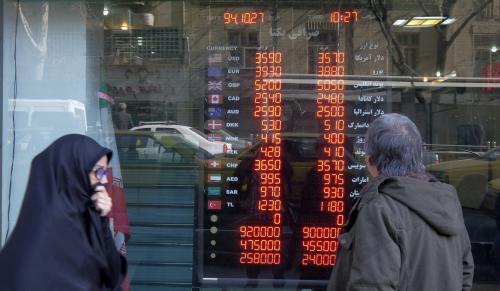In Iran, the only surprise regarding President Donald Trump’s May 8 announcement to leave the Joint Comprehensive Plan of Action (JCPOA) was that it was four days early. The decision was anticipated, and most Iranians believed that the deal was not doing much anyway.
What did surprise them was the response of their own leaders. Despite their earlier rhetoric to leave the JCPOA as soon as the United States did, Iranian leaders decided to stay in the nuclear deal, at least until they found out if Europe could help Iran get the deal’s benefits. This was a big concession on Iran’s part, which has been very critical of the three European powers—France, Germany, and the United Kingdom (E3)—for attempting to placate the U.S. at the expense of Iran.
Perhaps it was fear of further economic instability that persuaded Iran’s Supreme Leader Ayatollah Ali Khamenei to eschew drastic action, such as resuming enrichment or even exiting the Non Proliferation Treaty, as some have been advocating in Tehran. Disappointing his hardline supporters, he offered his blessings for further negotiations with Europe, albeit noting his deep skepticism. The country’s moderates, led by President Hassan Rouhani, who seems happy to take a deal without the U.S. over no deal at all, were apparently able to win another chance at rapprochement with the West. They may succeed because compromising with Europe is less noxious for Iran than compromising with the “Great Satan” that is the U.S.
Volatile economic situation
Iran’s economy is not doing well, but it is not in a “free fall,” as the New York Times put it recently, perhaps reflecting sentiments in the streets. There are no gas lines, no mass withdrawals from banks, and supermarket shelves are well stocked. Economic growth has slowed down considerably after its initial spurt following the nuclear deal, but the situation is far from panic.
Economic volatility began a few months ago in the parallel market for foreign exchange, as Trump’s resolve to take the U.S. out of the JCPOA became more clear. Iran’s tough measures taken to stem the fall in Iran’s currency in April have added to the volatility. The government shut down the parallel market, which aided capital flight but also facilitated a significant fraction of Iran’s foreign trade. Prices of many non-essential imports that do not receive subsidized foreign exchange started to rise in tandem with the rapidly falling value of the rial in the narrow illegal market. Many smaller exporters who have to sell their foreign currency earnings to the government at the official rate (42,000 rials per U.S. dollar) are on the verge of shutting down. Other businesses are hurting because of exceptionally high interest rates, exceeding the rate of inflation by as much as 8-10 percentage points. Iranian banks have yet to emerge from insolvency caused by the real estate crash of five years ago.
As growth slows down, Rouhani’s most important domestic economic achievement, bringing inflation down to below 10 percent, is in danger of being lost as devaluation, rising wages, and the budget deficit are returning inflation to double digits. In March, the government raised the minimum wage by 19 percent and other government wages by 10 percent, perhaps as a response to the urban unrest that swept smaller Iranian cities a few months ago. The budget deficit, running at 3 percent of the GDP, also contributes to inflation.
The JCPOA is not a cure-all, but it helped Iran’s economy grow by 12.5 percent in the Iranian fiscal year 2016/2017. During the same year, the economy generated 700,000 new jobs, 10 times as many as from 2006 to 2011, before sanctions hit hard. How much of these gains can Europe salvage in the face of the U.S. secondary sanctions—“the harshest ever”—is anybody’s guess.
Europe will probably not be able to maintain its own purchases of Iranian oil, about one-third of all Iranian exports, beyond the six-month grace period offered by the U.S. Nor is it likely to be able to persuade its multinational corporations to invest in Iran, something that was high on the list of expected benefits of the JCPOA. The risk of hefty fines and losing access to the much larger U.S. market will scare any CEO who signed an agreement with Iran in recent months.
Europe may be able to direct its central banks to provide Iran with access to earnings from the sale of oil to other countries. Central banks do not engage in commercial activity, but these are extraordinary times that call for extraordinary measures. This would be a sign of seriousness on the part of Europe that so far has been lacking in negotiations with Iran. Since signing the JCPOA, the Iranian embassy in London, where the U.K. government has presumably some control over banks, has been unable to open a bank account.
In the most likely scenario, Iran’s oil exports will go down from their current level of 2.5 million barrels per day by 1 million barrels per day. If it can use the proceeds to buy stuff from the rest of the world, Iran should be able to scrape off a modest growth of 3-4 percent per year.
From Iran’s point of view, the JCPOA is much more than a nuclear deal. Rouhani and the middle class that elected him twice see the JCPOA as a way to anchor the Islamic Republic’s economic system to the Western world. They see this as more consistent with Iran’s cultural ties to the West developed over the last 100 years. These ties have been further solidified by Iranian migration to the West, where traveling Iranian businessmen are sure to find a close relative. Not so in China or Russia, to which Iran will have to turn if it is rebuffed by Europe. The Islamic Republic’s early orientation summed up by the slogan, “Neither West, nor East,” is rapidly shifting toward the East as Trump humiliates Iran’s moderates.
This shift is already noticeable in foreign policy. If the current effort to save the JCPOA with the help of Europe fails, it will soon affect the direction in which Iran’s economy changes, from one striving to build a competitive capitalist system to one reverting to state ownership and non-market allocations. The significance of the historic moment that Iran finds itself was not lost to the Obama team that signed the JCPOA. It sounds alien to team Trump who view Iran and the nuclear deal in a menacing regional context.





Commentary
With the US out, how can Iran benefit from the JCPOA?
May 16, 2018